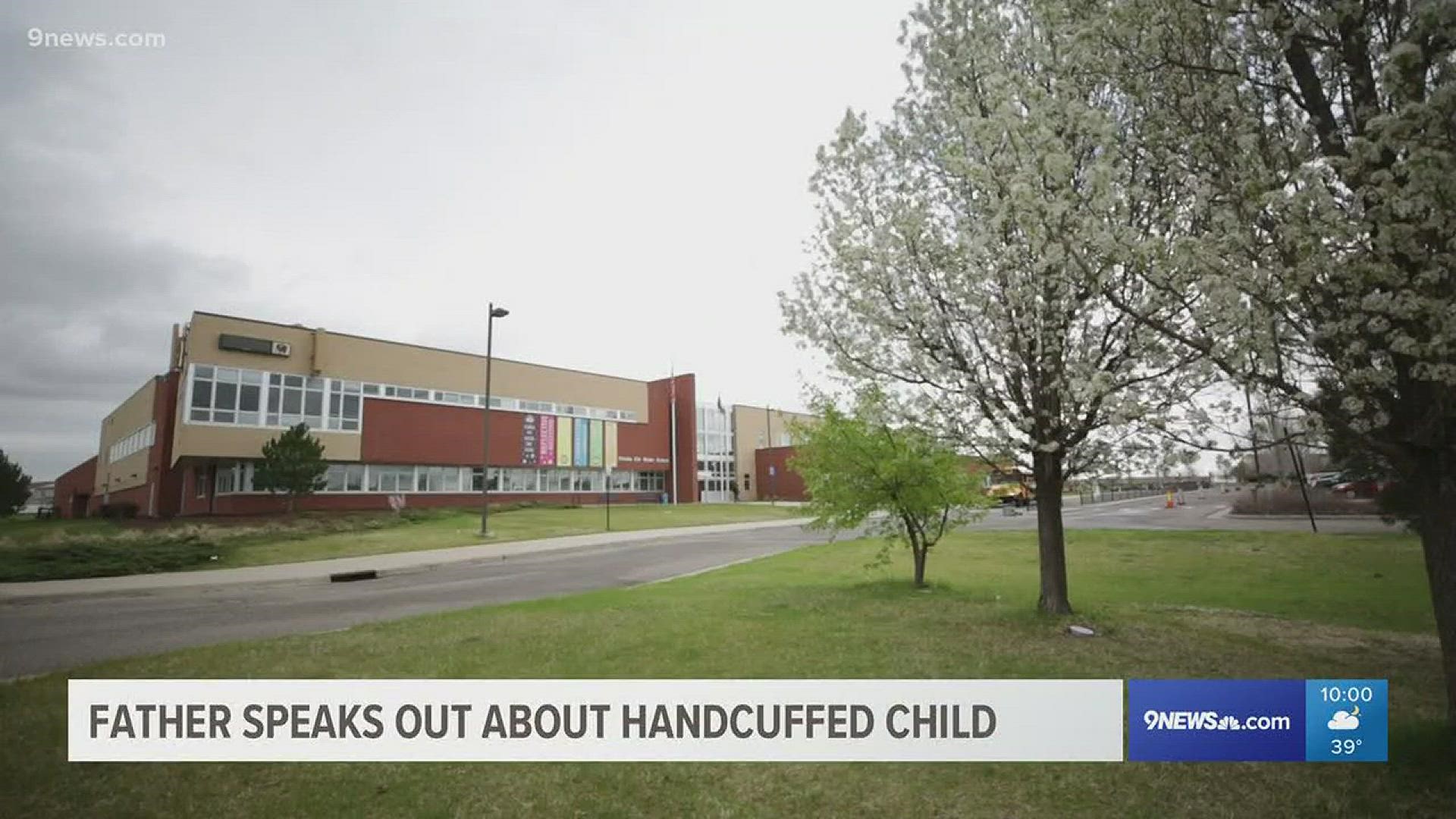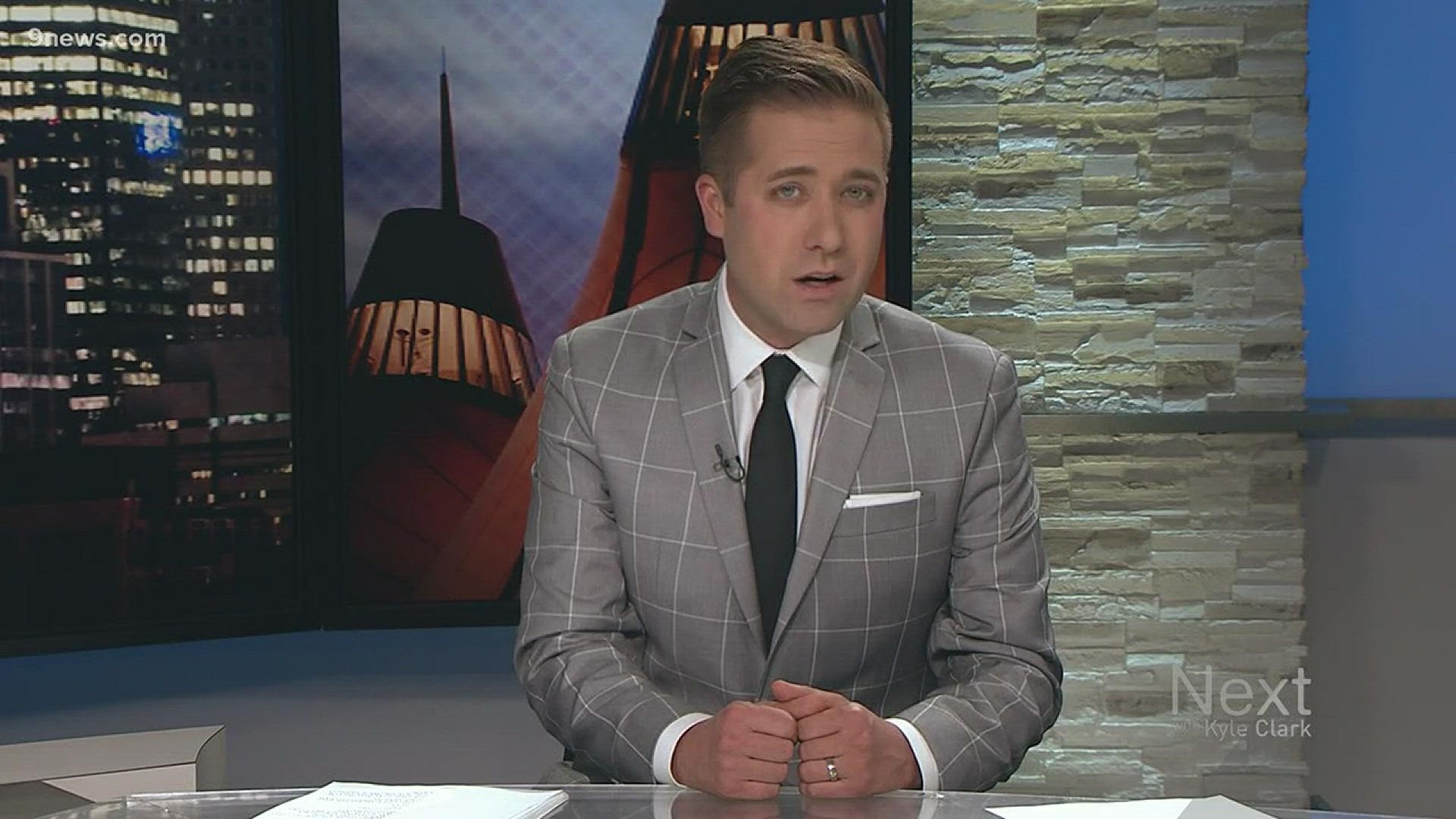DENVER —
A parent of a student at a Denver elementary school said his son was handcuffed at school. That father described what happened to his son on April 19 at Florida Pitt Waller School in Denver's Green Valley Ranch neighborhood for the first time.
“They were grabbing him and pulling him,” Brandon Pryor said. “He used his dead weight to sit down and just sat there. Then they jerked him back off of the ground and physically drug him by his arm to a classroom where they put handcuffs on him.”
Pryor said he got a call after his son and a classmate fought. That’s when he learned restraints were put on him.
“There’s never a reason for a 7-year-old to be placed in handcuffs and criminalized basically for getting into a schoolyard fight,” Pryor said. “I was just outraged. I couldn’t believe that the people who have been put to the task of protecting our children are actually hurting and harming our children.”
A report given to the Denver School Board, and partially obtained by 9Wants to Know, shows 58 students have been handcuffed by Denver Public School (DPS) safety employees from 2017 to 2019.
“It didn’t surprise me, it didn’t surprise me at all I see the police out here almost every day,” Pryor said.
District officials 'reviewing the use of restraints'
Ana Alejo, chief communications officer for DPS, said in a statement that handcuffs can be used “only as a last resort” and if there is an “imminent danger.” While she declined to comment on the incident involving Pryor’s son, she said district officials are “reviewing the use of restraints and the training for our security officers.”
9Wants to Know obtained part of the report through a records request. Alejo said in an email the full report to the board is “privileged information.”
Board members asked for data after an “incident” surfaced. The board asked for the report after Pryor’s complaint surfaced on social media in April. Alejo said the Board will review restraint policies and “provide recommendations on any changes needed to policy or practice.”
This issue came up during a Board of Education Work Session in late last month. School Board President Anne Rowe was alarmed by the prospect of mechanical restraints being used in schools.
“I have an incredibly difficult time imagining any scenario where any young person would be put in handcuffs,” Rowe said on Monday. “And I also struggle deeply with the impact on that young person in the trauma and the going forward thinking about their future.”
Handcuffing instances
Here's a look at some of the instances were students were placed in handcuffs in recent years:
- 2018-2019 school year: 738 "child in crisis calls" and other calls to the Safety Department; 27 students placed in handcuffs.
- 2017 to 2018 school year: 832 calls; 31 students placed in handcuffs.
That's 58 students placed in handcuffs.
'Even one incident can trigger prolonged stress'
Julian Ford, a clinical psychologist and director of the Center for Trauma Recovery and Juvenile Justice in Connecticut, said that an instance of using physical restraints, like handcuffs, won’t change a child’s life forever, it can trigger short-term problems long after the incident with sleep, learning, relationships and trust.
“Any child that experiences that experiences that physical restraint will have intense stress reaction and shift into survival mode,” Ford said in a phone call. “While one incident won’t change child’s life, even one incident can trigger prolonged stress reaction that can take years to recover from.”
Pamela Bisceglia, a child advocate with the Child and Family Advocacy Center, said she works with numerous families who have children who have been handcuffed, sometimes multiple times, inside DPS schools.
"When I think of even 58 students being handcuffed by safety and security officers, I'd like to know what did they learn?" Bisceglia asked. "What do they need to do different next time? What was the reason for putting that child on handcuffs and was there something else less restrictive that you could've done to address the behavior or calm the student."
The district said they "partner with Pam Bisceglia regularly and appreciate her leadership on behalf of students with special needs. She is a member of our Special Education Task Force. We’re working with Pam to address a variety of issues that impact our students who receive special education services."
A look at DPS restraint policy
Pryor wants to limit these types of incidents from happening again. He’s seeking policy changes like better training for school officials to know how to deal with these situations, more mental health resources and trauma counseling for families who have gone through this.
Board Member Jennifer Bacon said during a work session she wants the board to “keep accountability” of the school system.
“I don’t want to leave it up to social media,” she said.
DPS said 140 safety employees, including patrol officers and campus safety officers, monitor 93,000 students in the district. DPS provided data that showed these employees are mandated to have at least 24 hours of crisis intervention training in their first year on the job.
“We try to do this very sparingly and by following the guidance of these policies,” Denver Public Schools Superintendent Susana Cordova said during a working group session.
A review of the policy secured by 9Wants to Know outlines rules if a restraint is used. The student’s blood circulation and airway can’t be restricted. “Excess pressure” can’t be placed on his or her back. A student should be released from handcuffs within 15 minutes “except when precluded for safety reasons.”
Cordova said restraints can only be used by safety personnel “only in extremely rare scenarios.”
“Any time that we find that our actions don’t align with that vision of being a safe and welcoming environment that uses trauma informed practices it’s really important that we communicate very clearly and frequently both with students and families that might be impacted by this,” Cordova said on Monday. “That we gather facts. That we review what happens. And we determine if policy was followed and if frankly, policy needs to be addressed.”
DPS Chief of Safety Mike Eaton said on during a Board meeting on this topic that the use of handcuffs “really needs to be a last resort.”
If restraints are used, the force policy said the school is required to tell the parents no later than the end of the school day that the restraint was used according to DPS policy obtained by 9Wants to Know.
A report that describes the incident, efforts to de-escalate the situation, alternatives attempted, any injuries that happened and other details surrounding the use of force has to be given to parents within five calendar days. Pryor said he has not received the final report on his son’s incident.
Eaton said if a parent complains excessive force was used, the force review board will review all documentation and conduct interviews to see if the response was appropriate.
“We want to make sure that restraints may never be used as a punitive form of discipline or threat," Eaton said. “We’re not threatening to put handcuffs on. We’re not threatening as a discipline tactic… As soon as that child is no longer a danger to themselves or others, those mechanical restraints come off.”
'A last-ditch effort'
Ford, who is also a tenured professor of psychiatry at the University of Connecticut, said it’s important handcuffs are only used as a “last-ditch effort” and are taught how to de-escalate.
An adult staying calm during intense stress encourages children to do the same because kids look to adults as role models, he said.
“They can learn how to cope with stress reactions without losing control. It doesn’t solve the problem, but it’s part of the jigsaw puzzle,” Ford said.
A safe place for kids
Pryor said he ultimately wants the school to be a place where his child feels comfortable again.
“School should be a safe place where kids are allowed mistakes and the adults inside the school should have the training to be able to correct them in a loving caring way,” Pryor said.
Have handcuffs or any other use of force been used on your child? We want to hear from you. Email Zack Newman at zack.newman@9news.com.


